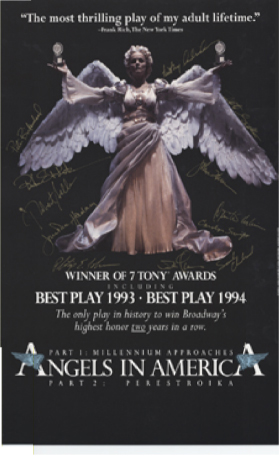Difference between revisions of "World Theater"
(table) |
m |
||
| Line 11: | Line 11: | ||
|- | |- | ||
| [[Image:Angmer.jpg]] <div style="text-align: center;"> | | [[Image:Angmer.jpg]] <div style="text-align: center;"> | ||
| − | <small>'''Angels in America poster, signed by the cast in Minneapolis' State Theater. Courtesy of the [[Jean-Nickolaus Tretter | + | <small>'''Angels in America poster, signed by the cast in Minneapolis' State Theater. Courtesy of the [[Jean-Nickolaus Tretter Collection]].'''</small> |
</div> | </div> | ||
| He is the only mayor in St. Paul’s history to withhold this ceremonial gesture to the GLBT community since the Pride Committee began the practice in the 1970s. A year after the first upsetting refusal took place, Coleman again came under fire for withholding support to the local queer community. | | He is the only mayor in St. Paul’s history to withhold this ceremonial gesture to the GLBT community since the Pride Committee began the practice in the 1970s. A year after the first upsetting refusal took place, Coleman again came under fire for withholding support to the local queer community. | ||
Revision as of 17:17, 23 March 2010
(Now the Fitzgerald Theater) Eastern Corner of Wabasha St. and Exchange St.
Downtown St. Paul’s oldest surviving theater is best known as the broadcast headquarters of Garrison Keillor’s “A Prairie Home Companion,” but it is also an important site of recent queer history in the Grand Old City. Norm Coleman, then-mayor of St. Paul (who was also a then-democrat until 1996), was already unpopular with queer people in St. Paul. He refused to sign a joint proclamation with Minneapolis declaring “Gat Pride Day” in 1993, and continued to refuse a signature for the remainder of his time in office.
 Angels in America poster, signed by the cast in Minneapolis' State Theater. Courtesy of the Jean-Nickolaus Tretter Collection. |
He is the only mayor in St. Paul’s history to withhold this ceremonial gesture to the GLBT community since the Pride Committee began the practice in the 1970s. A year after the first upsetting refusal took place, Coleman again came under fire for withholding support to the local queer community.
|
This page is under construction. -SVC
Part of Minneapolis/St. Paul, MN: 100 Queer Places in Minnesota History, (1860-1969), (1969-2010)